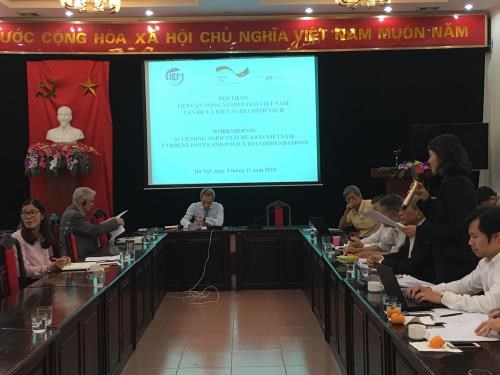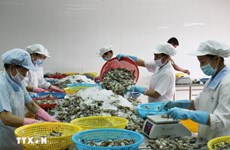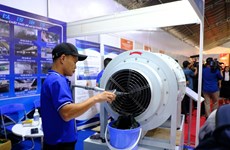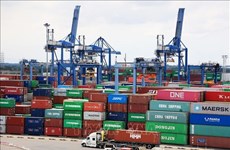Experts make policy recommendations to foster Agriculture 4.0
Experts outlined challenges and made policy recommendations to enhance the use of advanced technology in agriculture during a seminar on approaching Agriculture 4.0 held by the Central Institute for Economic Management (CIEM) in Hanoi on November 9.
 Scene at the seminar (Photo: VNA)
Scene at the seminar (Photo: VNA)Hanoi (VNA) – Experts outlined challenges and made policy recommendations to enhance the use of advanced technology in agriculture during a seminar on approaching Agriculture 4.0 held by the Central Institute for Economic Management (CIEM) in Hanoi on November 9.
Addressing the event, CIEM Deputy Director Phan Duc Hieu said that the Fourth Industrial Revolution (Industry 4.0) has increased efficiency in agriculture for many countries. In Vietnam, several agribusinesses have applied digital technologies in their production stages, from seedling and cultivation to harvest and distribution, he said.
Though Industry 4.0 helps reduce labour intensity and improve productivity for the sector, few companies have made proper use of the technology, he noted, emphasising the need to formulate policies to foster better high-tech approaches amongst agribusinesses.
Nguyen Thi Luyen, head of the CIEM’s Department of Economic Institution, mentioned the significance of agriculture in the country’s economic growth, saying the sector has enjoyed an increasing trade surplus, which has exceeded 8 billion USD so far this year, not to mention providing 40 percent of the nation’s total employment.
Vietnam will see stronger waves of technological innovation in agriculture as it works towards further international integration and trade liberalisation, yet competition will also become stiffer, Luyen noted.
To satisfy the growing demand of consumers, companies should be striving to apply the latest Industry 4.0 advancements, like smart agriculture sensors, Internet of Things, drones, farming robots, or smart financial management in farms, she suggested.
She moved on to cite Israel’s experience in taking advantage of the Fourth Industrial Revolution. Though Israel is a small country, lacking labourers in its farming sector, and has suffered chronic water shortages for years (with two-thirds of its total area as arid or semi-arid land), it is one of the world’s leaders in agriculture. Israeli agriculture has been built on technological innovation and advancement, rather than competitive edges in natural conditions. There are firms providing comprehensive technological solutions for precision agriculture, so all farms and net houses in Israel are installed with a digital control system, using sensors and automated technologies.
In Vietnam, some firms, cooperatives and farmers have started using smart technologies in farming in recent years. For example, VIFARM JSC based in Ba Ria-Vung Tau has developed a computer-operated hydroponic system for growing vegetables, while Cau Dat Farm has invested in an automated agricultural production from farm to fork, she noted.
However, the number of such companies is relatively small and more advanced technologies have been applied only in a few stages of production, she added.
There is plenty of room for agriculture to expand in Vietnam, but if the sector cannot seize opportunities from Industry 4.0 wave to increase productivity and product quality, it will be left behind, Assoc. Prof., PhD. Dinh Dung Sy from the Government Office said.
Sy further noted that agricultural investment towards sustainability should be a focus of the country’s socio-economic development in the next decade. It is vital to connect agribusinesses, investors, and farmers and, at the same time, extend land use permits and facilitate the more flexible conversion of farming land that allows shifts from growing rice to other crops, aquaculture, or animal husbandry that have higher added value, he recommended.
The Government should also encourage the establishment of agribusinesses, he added.
CIEM’s Hieu highlighted the importance of selecting appropriate technology in agriculture and developing signature farming products for each province and region that fit market needs. Furthermore, the Government must adopt business-centred policies that support the transfer of agricultural technology and the formation of a sustainable farming supply chain, he said. –VNA













